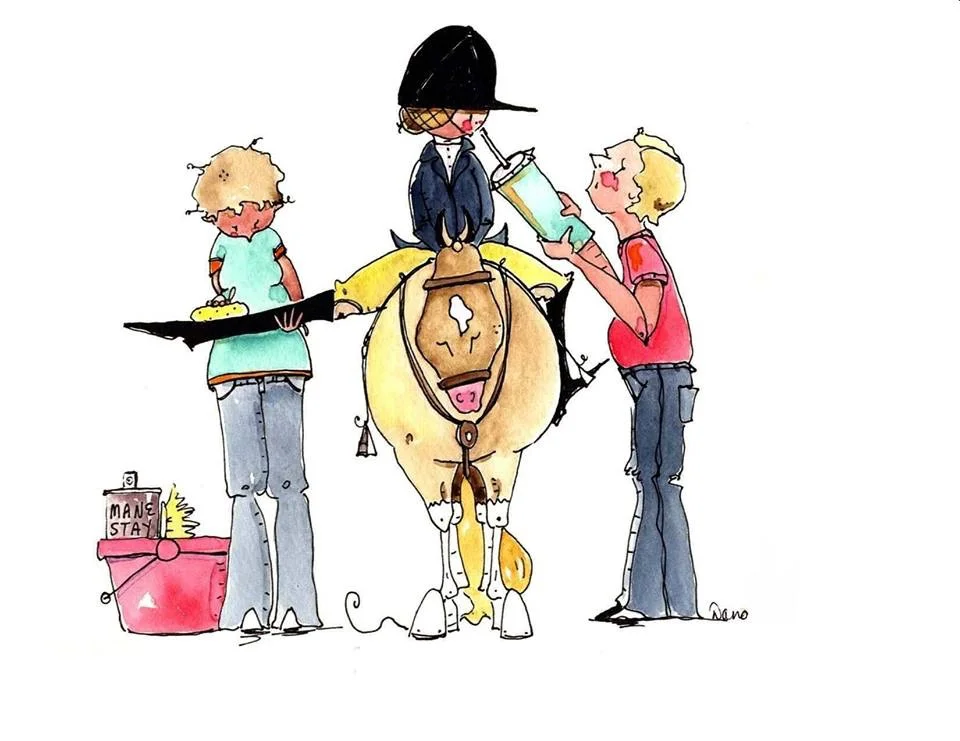We all want what’s best for our horses. One area of the horse world that I have seen grow is the amount of people using bodywork on their horses. I am lucky to be one of the humans out there doing bodywork on these wonderful animals. Most humans have the best of intentions with their horses. Working on 20+ horses a month has taught me a great deal about their physical & emotional being. In turn I have learned how to educate the horse owner to understand their horses physical & emotional state and what to do to help them.
What I have learned is riders focus mostly on learning to ride better to help their horse (while this is VERY TRUE) it is not the only factor effecting the horses physical & emotional well being.
Below is the main areas I cover with my bodywork clients.
Every rider is trying to improve somehow. Most of us are not amazing riders who ride in perfect balance. We are where we are in our riding evolution, and that’s OK! What’s important about recognizing this, is your horse is going to respond to where your riding baseline is, and that’s Ok! For example; most intermediate riders are starting to get the correct timing of riding leg to hand to encourage connection and frame with their horse. But since they are just starting to get this they are not going to be perfect at it. It takes timeeeeee to develop this. So the horse has to tolerate their riders with. Riders with too much hand can cause the horse to curl their neck too much and get tight in their neck muscles. Riders with tense low hands can cause the horse to travel with head too high. This will cause tight glute muscles and hamstrings. Horses are one of the most forgiving animals alive and they tolerate our learning curve. But…. we must give back to them by taking care of their physical & emotion states, with modalities like bodywork, chiropractic, etc. The bodywork will help relieve some the tension in the muscles that is caused by the riding. This will prevent the muscles from becoming too tight which causes other issues, and help restore the horse. They will have a better chance at staying sound and happy.
Like I stated most riders naturally focus just on the riding part of the horses world. But when you add up how many minutes a day you are with them vs them just in their living space, we aren’t with them very much. We all know horses can be very creative! I massage most of my clients in their living space (vs the cross ties etc) and I have seen many things that explain why certain areas are always tight! For example: I had a gymkanna horse I did bodywork on every two weeks. He lived in a big pasture. I saw and knew he had a good rider. He ate naturally off the ground. Yet, he always had a tight, overdeveloped muscle on his left lower neck. I could not figure it out, until one day I was doing bodywork on his pasture mate. Every time the gymkhana horse went to bite a fly he ALWAYS turned his head to the left! Every two minutes he went to bite at flies and it was always to the left! If you had up how many minutes a day he’s doing that, that’s a lot of minutes!! I studied him longer because he never turned his head to the right to bit flies. It was just his way of warding off the flies. If you study horses most have a certain movement they do to ward off the flies. Whatever movement they are doing, somehow moves their whole body in such a way it gets all the flies on them. SO with no human interaction this guy is creating and keeping that muscle tight!
The horses living environment. Some have big space, some have no space. Obviously we all want big green Kentucky land for them, but sadly that’s not the case here in CA. So us horse owners have to work with what is. If your horse has a small space, just know that! And know their living space will have a natural impact on their physical & emotional state. Just like the riding topic, I’m not saying good or bad, just know so you can help support their physical & emotional being to keep them happy and sound.
In summary, we all want what’s best for our horses. One of the best things we can give them is to understand all factors of their lives and how to help those areas.







